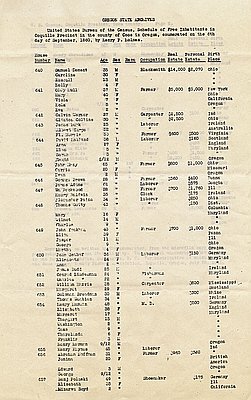This sketch, published in an article in the June 1856 issue of Harper’s Monthly, depicts a group of Coos butchering a whale on the shore of present-day Coos Bay in the fall of 1855. The author, journalist and writer William V. Wells, was from Boston. He had traveled to Oregon Territory by ship and documented his travels for the magazine in an article titled "Wild Life in Oregon." Wells’s descriptions of the landscape and the people he met are vibrant and detailed, no doubt meant to entertain a readership that was curious about the distant West. His interest in Native people is apparent, but his accounts are hindered by his ignorance of Indians and his feelings of racial superiority—sentiments common to nineteenth-century Euro-Americans.
Wells was headed south to California when he heard about a beached whale "near the Heads"–that is, the headlands–near Coos Bay. The whale was likely a humpback and had been on the beach for some time, “as all the air was a putrid stench.” Dozens of local men and women were butchering the animal and roasting the meat for food.
The homelands of the Coos include the Coos River and its tributaries, and their villages dotted the edges of the estuaries. Like other Native peoples of the Northwest Coast, the Coos relied on salmon for their subsistence, though they also made use of a wide variety of other resources, including herring, smelt, shellfish, roots, berries, deer, elk, and, as this illustration shows, whales.
Members of the 1804-1806 Lewis and Clark Expedition were among the first non-Natives to describe the Native use of whales along the upper West Coast. William Clark, for example, noted that the “Whale is Sometimes pursued harpooned and taken by the Indians of this Coast.” People on Vancouver Island and the Olympic Peninsula hunted whales at sea, and there is archeological evidence suggesting that Native peoples south of those areas also actively hunted the marine mammals.
The beaching of the whale at Coos Bay in the fall of 1855 was a fortunate event for the Coos, whose community had been disrupted by waves of epidemic disease and the arrival of white miners searching for gold. Earlier that year, the Coos had agreed by treaty to relinquish much of their lands to the United States in exchange for a protected reservation and compensation in the form of money payments, useful infrastructure (such as mills and schoolhouses), and supplies. The U.S. Senate never ratified that treaty. In 1860, most of the Coos were forcibly relocated to the Alsea Reservation, although many returned to their homeland when that reservation was closed in 1875. Today, their descendants are part of the Confederated Tribes of the Coos, Lower Umpqua, and Siuslaw Indians.

